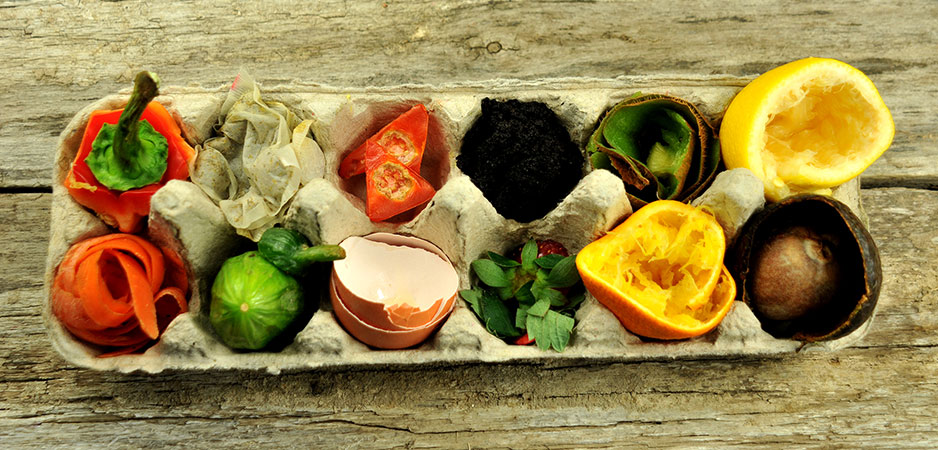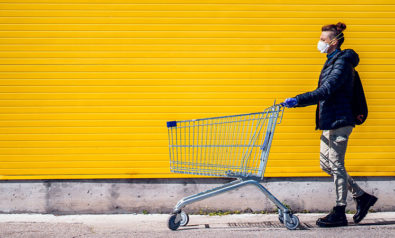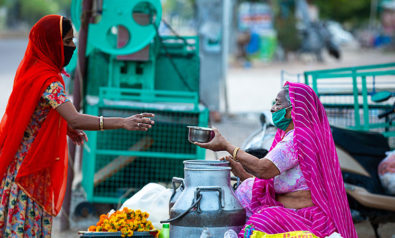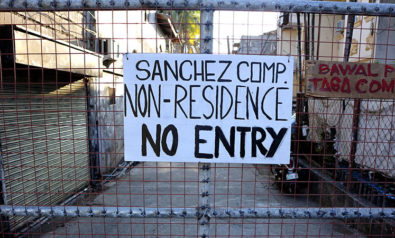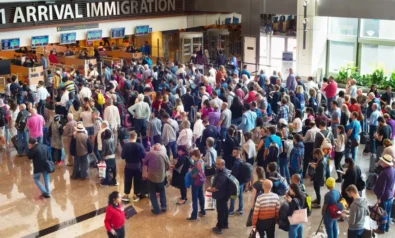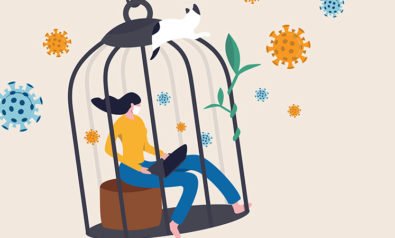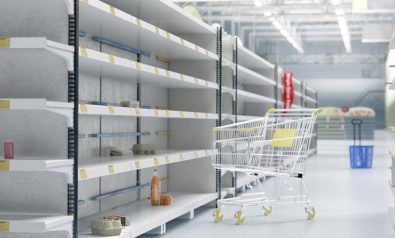Today, the world faces one of its most challenging crises of the 21st century. A tiny yet powerful virus has been able to shed light on a number of questions we all knew but might not have truly comprehended. First, we are incredibly interconnected, from Wuhan to Milan to New York. Second, we are less immune to global crises than we would like to acknowledge, as the seriousness of the coronavirus pandemic has shown. Third, scarcity is real, as anyone who has been to a grocery store looking for toilet paper at the start of the outbreak would agree. The new norm has been closedness rather than openness: Everything from gyms to public spaces to borders has been closed, and quarantine is the word on everyone’s lips.
The last thing anyone wants is for the situation to become chaotic. The current state of affairs has led to a great deal of communal fear and anxiety. When that happens, we tend to expect the worst, and rather than sit and wait, it is an instinct to get ready for the fight. Stocking up is an understandable reaction in times of uncertainty and fear like these, and stockpiling of dry and canned foods is even encouraged as preparation for a crisis. But how can we assure we have enough food at home while also being mindful of reducing food waste? And how do we counter the COVID-19 emergency without losing sight of other creeping crises like environmental degradation and climate change?
How Was It before?
Let’s start by understanding that the food waste problem is not exclusive to the current times. According to the UN Food and Agriculture Organization, if food waste were a country, it would be the 3rd largest contributor to greenhouse gas emissions. In Sweden in particular, 1.3 million tons of food are wasted, half of which researchers classify as unnecessary waste. Just to give a clear idea, we are talking about 65 kilograms of unnecessary waste for each person living in Sweden each year. Sounds like a lot, right? Most of it is due to household waste, although some food is also spilled in the logistics chain before it even gets to our plates. But all of this was before the COVID-19 crisis.
Food waste reduction is one of the UN Sustainable Development Goals (SDGs) set to be reached before 2030 and is considered to be a strong tool for the bold goals set by the Paris Climate Agreement. According to Project Drawdown, an initiative that lists the most effective interventions to reduce CO2 emissions, reducing food waste is the most important measure to stop global warming at 2° Celcius. The whole of society needs to act to make this goal achievable. Associate Professor Helen Williams, from Karlstad University, thinks that “This is a task for collaborative action between governments, food companies, retailers and consumers.”
Governments, companies, universities and citizens need to join forces to reduce food waste. To that regard, in 2017 the Swedish government tasked the Swedish Food Agency, in collaboration with the Swedish Environmental Protection Agency and the Swedish Board of Agriculture, with creating an initiative on food waste, resulting in a 42-item action plan. According to Karin Fritz, project lead of the government assignment, in order to succeed we “need to cooperate, it’s together we will be able to make a difference.”
And actions are being taken. Universities in Karlstad, Gothenburg and Linköping all have their own research areas for food waste reduction that are leading the way to a better understanding of the problem and recommending better tools to tackle it. There are also creative Swedish startups working to reduce food waste. Karma provides a platform for restaurants and grocery stores to sell their leftovers to a reduced price; Rescued Fruits makes fresh juice out of surplus fruits and vegetables; Sopköket is a restaurant where meals always consist of more than 50% “saved” food items; Foodloopz is offering consulting services to companies that want to reduce their food waste; and Snömoln, a digital marketplace between restaurant and wholesalers that reduces waste through more efficient forecasting.
However, there are very few initiatives focused on reducing food waste in households, where the need for good solutions is more critical as almost 50% of food waste occurs at home. As a matter of fact, household food waste is greater than that of restaurant and industrial kitchens combined. One service is provided by Plant Jammer, a Danish app where you type in the food items that are soon to be expired and get a recipe for these ingredients. Another service is provided by the British startup OLIO, which allows households to share surplus foods with each other. More initiatives like this, focusing on households, are urgently needed.
What Has Changed Due to the Crisis?
In the current situation, measuring the impacts of the crisis on food waste is quite a challenge. Food stores have, however, witnessed a clear change in consumption behavior with stocking up on food and a shift from sales from restaurants to food stores. In March, ICA, the biggest food supplier in Sweden, reported an increase in consumption, with numbers as high as 11% compared to the same time last year. Similar numbers are also seen among other Swedish supermarkets.
If this increase in consumption would only involve dry goods, it wouldn’t be as problematic, as their storage time is longer. However, according to recent numbers, the categories with the largest changes in sales are not just dry goods like pasta, flour and rice but also dairy, meat products, fruits and vegetables. As the storage time remains the same for these types of food, unless other actions are taken, one could foresee a large amount of food waste based on the changed consumption patterns as a result of the pandemic.
If initiatives to address the food waste problem in Sweden have been taken before the current crisis, they may need to be strengthened now. Creating and spreading knowledge about the issue of food waste is great, but we are still far from solving the problem — more action is needed. Ultimately, what’s on the table is a question of sustainable consumption, a matter that we should all be concerned about, even more so in the current situation.
The concern is discussed at universities as well. Professor Williams, who researches food waste in Sweden, states that “There is an obvious risk for increasing food waste when people buy more than they are used to and perhaps also buy food that they normally don’t use in their households.”
At the same time, there are some positive news that indicates a reduction in household waste since the start of the outbreak. OLIO has seen a 20% increase in food sharing between neighbors and a poll from Hubbub that asked 2,000 consumers in the UK how their eating habits have changed, showed that more than half of them are valuing food more now compared to before the outbreak of COVID-19. Also, 48% say they are throwing away less food, mostly thanks to more careful meal planning and better use of leftovers.
Karin Fritz thinks that this makes sense since “Some people are now working from home and therefore more people can eat leftovers and have time to take care of their food in time.” If that’s the case, there is a risk that many people will go back to their old habits when the crisis is over.
What Can Each of Us Do?
Acknowledging the problem and also trying to make a contribution, the Stockholm hub of the Global Shapers Community has recently launched a project with two clear goals. First, to raise awareness about food waste as well as helping people track and reduce their food waste. Second, to provide a large-scale database on food waste in Sweden, something that is still missing today. For that, Global Shapers Stockholm has created a poll in which consumers, by responding to a few questions, will contribute to a greater understanding of how the crisis has impacted food consumption patterns.
This will both help people to reduce their levels of food waste as well as contribute data about waste in households, something that there’s a strong need for. Without good understanding of data about food waste, we are fumbling in the dark and don’t know what solutions work best. Just look around you, and you will probably notice that you have been wasting food as well.
There are some easy tips to start reducing food waste today. First of all, measure how much food you usually waste in your bin, for example by counting how many bins you fill up each week. Then, get creative. Cook new meals with your leftovers with inspiration from No Leftovers to see how you can reduce your food waste over time. Also, use OLIO to donate your leftover food to those in need nearby. You can also contribute data that will lead to better policy by responding to the Global Shapers Stockholm’s poll.
Lately, it has been hard to think positively. The coronavirus crisis fills us with sadness and anxiety. Society is suddenly forced to face a number of questions that in normal times we had the privilege to postpone. Not anymore. The crisis is here and it brings to our attention a number of challenges we are not sure we are ready to face. Food waste is one of them.
Luckily, a number of initiatives are taking place in order to ease these risks as well as leave a positive heritage once the crisis is over. This is an opportunity for all of us to rethink our relationship with our food. Hopefully, this crisis will leave us stronger than it found us, in a world where we all have a balanced relationship with the environment and with our resources. Thinking about food waste is a step toward that.
The views expressed in this article are the author’s own and do not necessarily reflect Fair Observer’s editorial policy.
Support Fair Observer
We rely on your support for our independence, diversity and quality.
For more than 10 years, Fair Observer has been free, fair and independent. No billionaire owns us, no advertisers control us. We are a reader-supported nonprofit. Unlike many other publications, we keep our content free for readers regardless of where they live or whether they can afford to pay. We have no paywalls and no ads.
In the post-truth era of fake news, echo chambers and filter bubbles, we publish a plurality of perspectives from around the world. Anyone can publish with us, but everyone goes through a rigorous editorial process. So, you get fact-checked, well-reasoned content instead of noise.
We publish 2,500+ voices from 90+ countries. We also conduct education and training programs
on subjects ranging from digital media and journalism to writing and critical thinking. This
doesn’t come cheap. Servers, editors, trainers and web developers cost
money.
Please consider supporting us on a regular basis as a recurring donor or a
sustaining member.
Will you support FO’s journalism?
We rely on your support for our independence, diversity and quality.


